Analysis of Leadership and Operational Management at KPMG
VerifiedAdded on 2020/06/03
|17
|5963
|44
Report
AI Summary
This report provides a detailed analysis of leadership and operational management within KPMG. It begins by comparing the roles and characteristics of managers and leaders, highlighting their distinct functions in planning, organizing, and motivating employees. The report then explores how managers and leaders operate in various situational contexts, including training and development, decision-making processes, and managing work pressure. Different leadership approaches, such as situational, system, and contingency leadership theories, are examined, along with the application of hard and soft management skills. Furthermore, the report delves into the essential approaches of operational management and the roles of leaders and managers in achieving business objectives. It also assesses factors influencing decision-making and operational management, emphasizing the impact of environmental factors. The report concludes with recommendations and a critical analysis of operational management within KPMG.
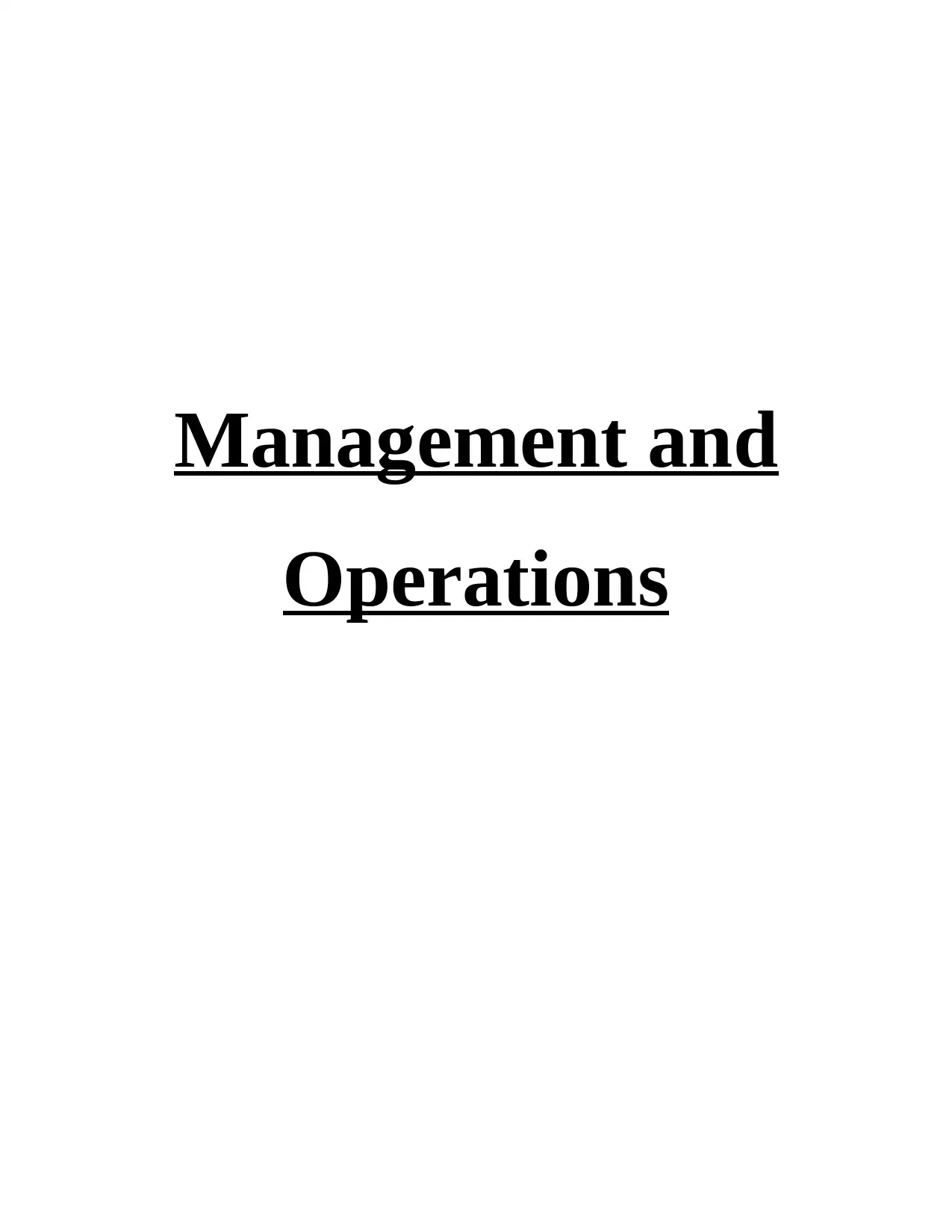
Management and
Operations
Operations
Paraphrase This Document
Need a fresh take? Get an instant paraphrase of this document with our AI Paraphraser
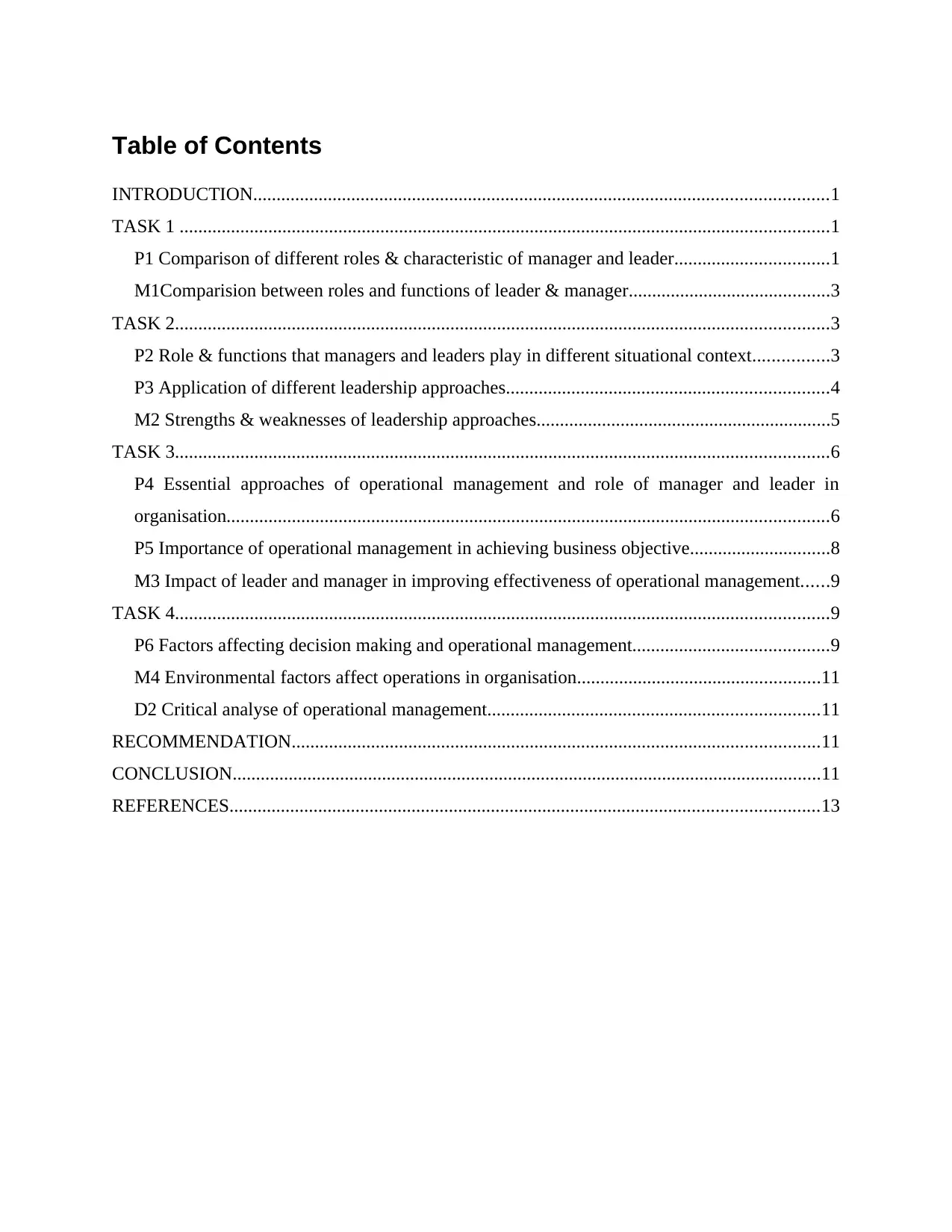
Table of Contents
INTRODUCTION...........................................................................................................................1
TASK 1 ...........................................................................................................................................1
P1 Comparison of different roles & characteristic of manager and leader.................................1
M1Comparision between roles and functions of leader & manager...........................................3
TASK 2............................................................................................................................................3
P2 Role & functions that managers and leaders play in different situational context................3
P3 Application of different leadership approaches.....................................................................4
M2 Strengths & weaknesses of leadership approaches...............................................................5
TASK 3............................................................................................................................................6
P4 Essential approaches of operational management and role of manager and leader in
organisation.................................................................................................................................6
P5 Importance of operational management in achieving business objective..............................8
M3 Impact of leader and manager in improving effectiveness of operational management......9
TASK 4............................................................................................................................................9
P6 Factors affecting decision making and operational management..........................................9
M4 Environmental factors affect operations in organisation....................................................11
D2 Critical analyse of operational management.......................................................................11
RECOMMENDATION.................................................................................................................11
CONCLUSION..............................................................................................................................11
REFERENCES..............................................................................................................................13
INTRODUCTION...........................................................................................................................1
TASK 1 ...........................................................................................................................................1
P1 Comparison of different roles & characteristic of manager and leader.................................1
M1Comparision between roles and functions of leader & manager...........................................3
TASK 2............................................................................................................................................3
P2 Role & functions that managers and leaders play in different situational context................3
P3 Application of different leadership approaches.....................................................................4
M2 Strengths & weaknesses of leadership approaches...............................................................5
TASK 3............................................................................................................................................6
P4 Essential approaches of operational management and role of manager and leader in
organisation.................................................................................................................................6
P5 Importance of operational management in achieving business objective..............................8
M3 Impact of leader and manager in improving effectiveness of operational management......9
TASK 4............................................................................................................................................9
P6 Factors affecting decision making and operational management..........................................9
M4 Environmental factors affect operations in organisation....................................................11
D2 Critical analyse of operational management.......................................................................11
RECOMMENDATION.................................................................................................................11
CONCLUSION..............................................................................................................................11
REFERENCES..............................................................................................................................13
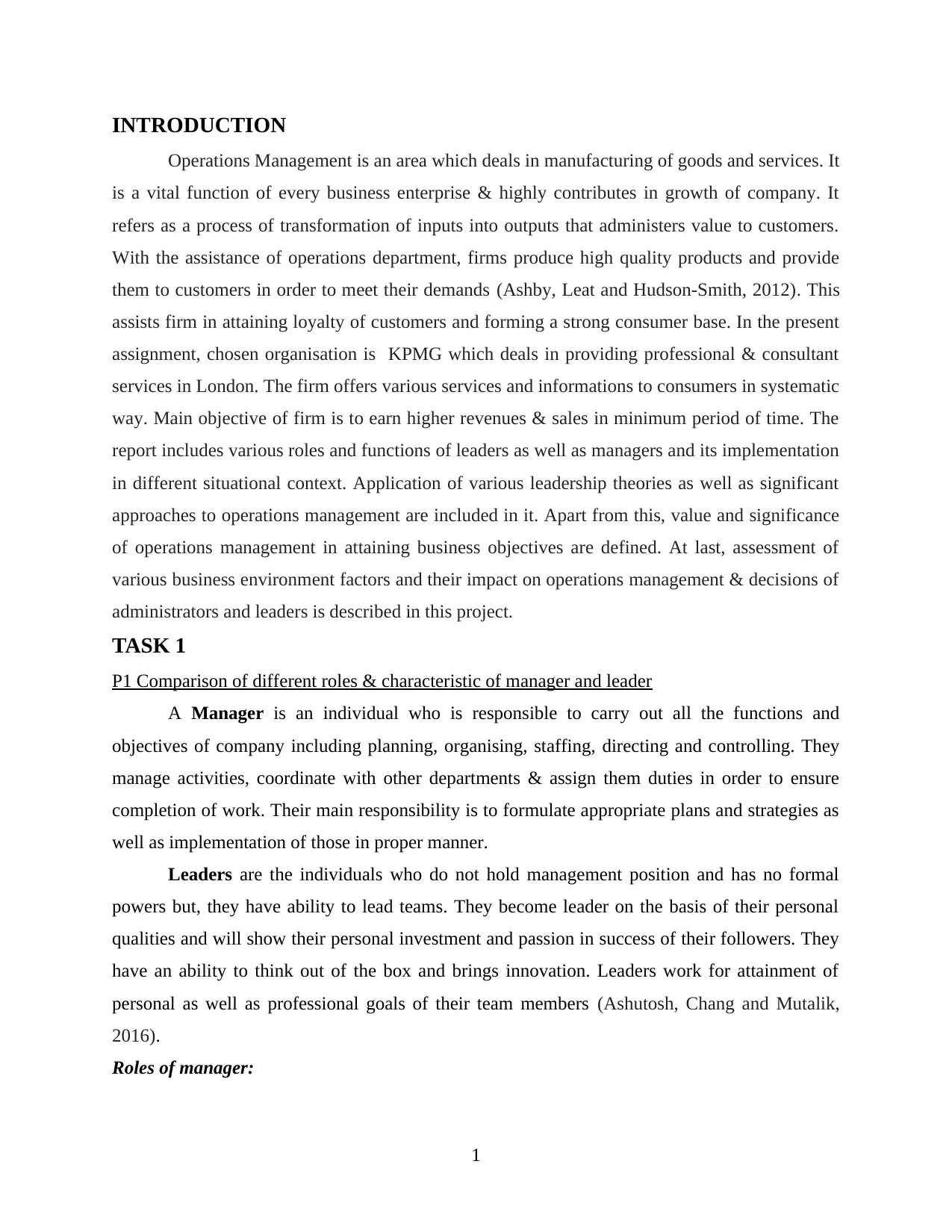
INTRODUCTION
Operations Management is an area which deals in manufacturing of goods and services. It
is a vital function of every business enterprise & highly contributes in growth of company. It
refers as a process of transformation of inputs into outputs that administers value to customers.
With the assistance of operations department, firms produce high quality products and provide
them to customers in order to meet their demands (Ashby, Leat and Hudson-Smith, 2012). This
assists firm in attaining loyalty of customers and forming a strong consumer base. In the present
assignment, chosen organisation is KPMG which deals in providing professional & consultant
services in London. The firm offers various services and informations to consumers in systematic
way. Main objective of firm is to earn higher revenues & sales in minimum period of time. The
report includes various roles and functions of leaders as well as managers and its implementation
in different situational context. Application of various leadership theories as well as significant
approaches to operations management are included in it. Apart from this, value and significance
of operations management in attaining business objectives are defined. At last, assessment of
various business environment factors and their impact on operations management & decisions of
administrators and leaders is described in this project.
TASK 1
P1 Comparison of different roles & characteristic of manager and leader
A Manager is an individual who is responsible to carry out all the functions and
objectives of company including planning, organising, staffing, directing and controlling. They
manage activities, coordinate with other departments & assign them duties in order to ensure
completion of work. Their main responsibility is to formulate appropriate plans and strategies as
well as implementation of those in proper manner.
Leaders are the individuals who do not hold management position and has no formal
powers but, they have ability to lead teams. They become leader on the basis of their personal
qualities and will show their personal investment and passion in success of their followers. They
have an ability to think out of the box and brings innovation. Leaders work for attainment of
personal as well as professional goals of their team members (Ashutosh, Chang and Mutalik,
2016).
Roles of manager:
1
Operations Management is an area which deals in manufacturing of goods and services. It
is a vital function of every business enterprise & highly contributes in growth of company. It
refers as a process of transformation of inputs into outputs that administers value to customers.
With the assistance of operations department, firms produce high quality products and provide
them to customers in order to meet their demands (Ashby, Leat and Hudson-Smith, 2012). This
assists firm in attaining loyalty of customers and forming a strong consumer base. In the present
assignment, chosen organisation is KPMG which deals in providing professional & consultant
services in London. The firm offers various services and informations to consumers in systematic
way. Main objective of firm is to earn higher revenues & sales in minimum period of time. The
report includes various roles and functions of leaders as well as managers and its implementation
in different situational context. Application of various leadership theories as well as significant
approaches to operations management are included in it. Apart from this, value and significance
of operations management in attaining business objectives are defined. At last, assessment of
various business environment factors and their impact on operations management & decisions of
administrators and leaders is described in this project.
TASK 1
P1 Comparison of different roles & characteristic of manager and leader
A Manager is an individual who is responsible to carry out all the functions and
objectives of company including planning, organising, staffing, directing and controlling. They
manage activities, coordinate with other departments & assign them duties in order to ensure
completion of work. Their main responsibility is to formulate appropriate plans and strategies as
well as implementation of those in proper manner.
Leaders are the individuals who do not hold management position and has no formal
powers but, they have ability to lead teams. They become leader on the basis of their personal
qualities and will show their personal investment and passion in success of their followers. They
have an ability to think out of the box and brings innovation. Leaders work for attainment of
personal as well as professional goals of their team members (Ashutosh, Chang and Mutalik,
2016).
Roles of manager:
1
⊘ This is a preview!⊘
Do you want full access?
Subscribe today to unlock all pages.

Trusted by 1+ million students worldwide
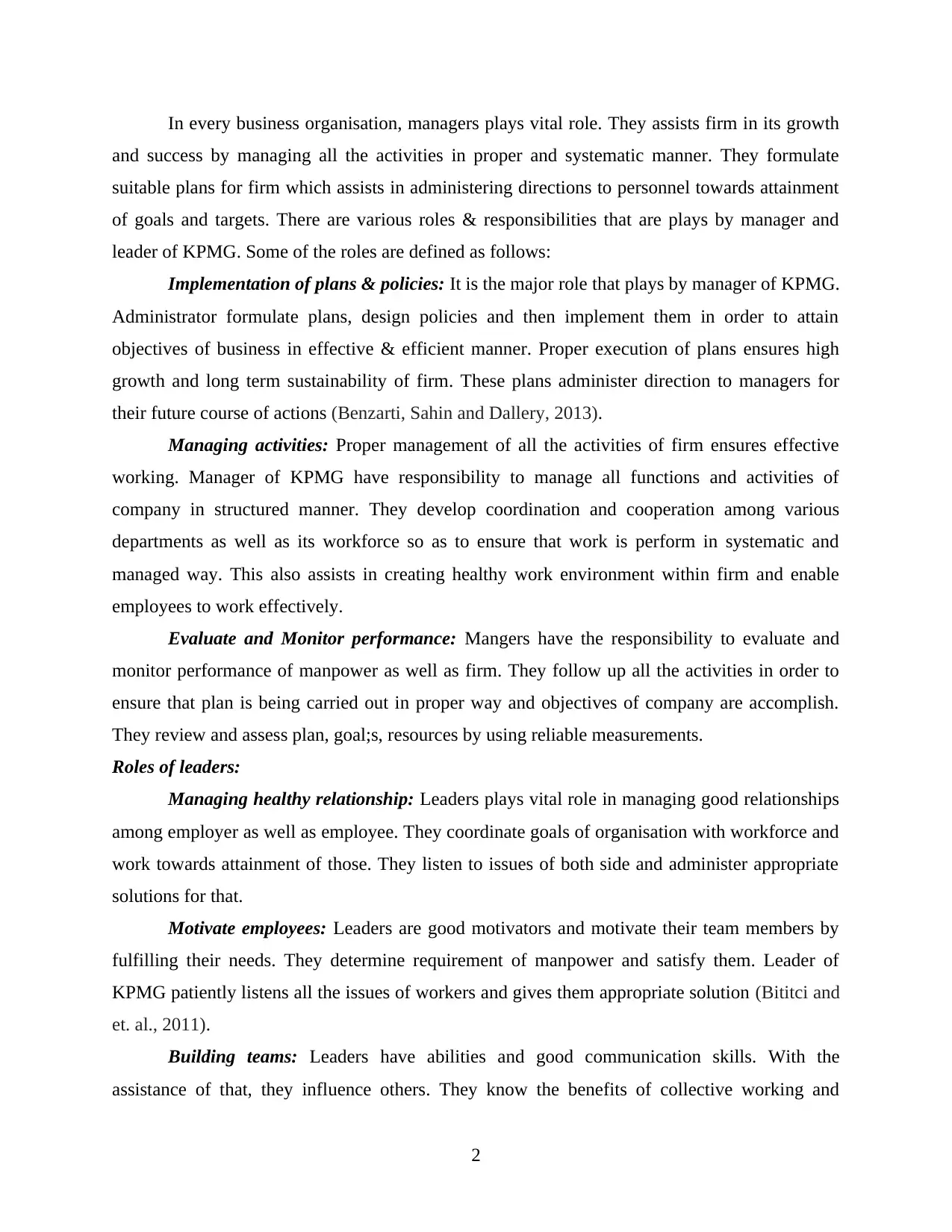
In every business organisation, managers plays vital role. They assists firm in its growth
and success by managing all the activities in proper and systematic manner. They formulate
suitable plans for firm which assists in administering directions to personnel towards attainment
of goals and targets. There are various roles & responsibilities that are plays by manager and
leader of KPMG. Some of the roles are defined as follows:
Implementation of plans & policies: It is the major role that plays by manager of KPMG.
Administrator formulate plans, design policies and then implement them in order to attain
objectives of business in effective & efficient manner. Proper execution of plans ensures high
growth and long term sustainability of firm. These plans administer direction to managers for
their future course of actions (Benzarti, Sahin and Dallery, 2013).
Managing activities: Proper management of all the activities of firm ensures effective
working. Manager of KPMG have responsibility to manage all functions and activities of
company in structured manner. They develop coordination and cooperation among various
departments as well as its workforce so as to ensure that work is perform in systematic and
managed way. This also assists in creating healthy work environment within firm and enable
employees to work effectively.
Evaluate and Monitor performance: Mangers have the responsibility to evaluate and
monitor performance of manpower as well as firm. They follow up all the activities in order to
ensure that plan is being carried out in proper way and objectives of company are accomplish.
They review and assess plan, goal;s, resources by using reliable measurements.
Roles of leaders:
Managing healthy relationship: Leaders plays vital role in managing good relationships
among employer as well as employee. They coordinate goals of organisation with workforce and
work towards attainment of those. They listen to issues of both side and administer appropriate
solutions for that.
Motivate employees: Leaders are good motivators and motivate their team members by
fulfilling their needs. They determine requirement of manpower and satisfy them. Leader of
KPMG patiently listens all the issues of workers and gives them appropriate solution (Bititci and
et. al., 2011).
Building teams: Leaders have abilities and good communication skills. With the
assistance of that, they influence others. They know the benefits of collective working and
2
and success by managing all the activities in proper and systematic manner. They formulate
suitable plans for firm which assists in administering directions to personnel towards attainment
of goals and targets. There are various roles & responsibilities that are plays by manager and
leader of KPMG. Some of the roles are defined as follows:
Implementation of plans & policies: It is the major role that plays by manager of KPMG.
Administrator formulate plans, design policies and then implement them in order to attain
objectives of business in effective & efficient manner. Proper execution of plans ensures high
growth and long term sustainability of firm. These plans administer direction to managers for
their future course of actions (Benzarti, Sahin and Dallery, 2013).
Managing activities: Proper management of all the activities of firm ensures effective
working. Manager of KPMG have responsibility to manage all functions and activities of
company in structured manner. They develop coordination and cooperation among various
departments as well as its workforce so as to ensure that work is perform in systematic and
managed way. This also assists in creating healthy work environment within firm and enable
employees to work effectively.
Evaluate and Monitor performance: Mangers have the responsibility to evaluate and
monitor performance of manpower as well as firm. They follow up all the activities in order to
ensure that plan is being carried out in proper way and objectives of company are accomplish.
They review and assess plan, goal;s, resources by using reliable measurements.
Roles of leaders:
Managing healthy relationship: Leaders plays vital role in managing good relationships
among employer as well as employee. They coordinate goals of organisation with workforce and
work towards attainment of those. They listen to issues of both side and administer appropriate
solutions for that.
Motivate employees: Leaders are good motivators and motivate their team members by
fulfilling their needs. They determine requirement of manpower and satisfy them. Leader of
KPMG patiently listens all the issues of workers and gives them appropriate solution (Bititci and
et. al., 2011).
Building teams: Leaders have abilities and good communication skills. With the
assistance of that, they influence others. They know the benefits of collective working and
2
Paraphrase This Document
Need a fresh take? Get an instant paraphrase of this document with our AI Paraphraser
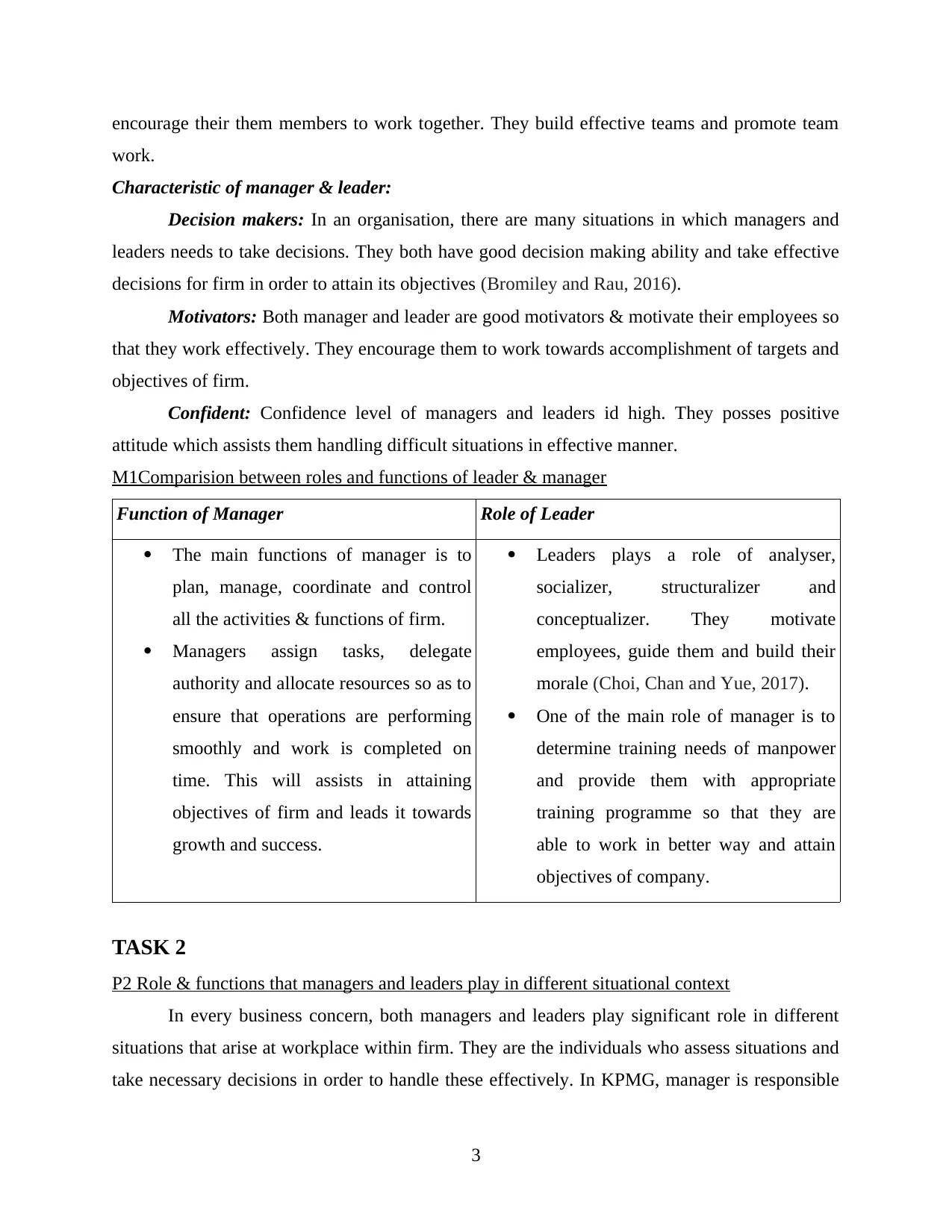
encourage their them members to work together. They build effective teams and promote team
work.
Characteristic of manager & leader:
Decision makers: In an organisation, there are many situations in which managers and
leaders needs to take decisions. They both have good decision making ability and take effective
decisions for firm in order to attain its objectives (Bromiley and Rau, 2016).
Motivators: Both manager and leader are good motivators & motivate their employees so
that they work effectively. They encourage them to work towards accomplishment of targets and
objectives of firm.
Confident: Confidence level of managers and leaders id high. They posses positive
attitude which assists them handling difficult situations in effective manner.
M1Comparision between roles and functions of leader & manager
Function of Manager Role of Leader
The main functions of manager is to
plan, manage, coordinate and control
all the activities & functions of firm.
Managers assign tasks, delegate
authority and allocate resources so as to
ensure that operations are performing
smoothly and work is completed on
time. This will assists in attaining
objectives of firm and leads it towards
growth and success.
Leaders plays a role of analyser,
socializer, structuralizer and
conceptualizer. They motivate
employees, guide them and build their
morale (Choi, Chan and Yue, 2017).
One of the main role of manager is to
determine training needs of manpower
and provide them with appropriate
training programme so that they are
able to work in better way and attain
objectives of company.
TASK 2
P2 Role & functions that managers and leaders play in different situational context
In every business concern, both managers and leaders play significant role in different
situations that arise at workplace within firm. They are the individuals who assess situations and
take necessary decisions in order to handle these effectively. In KPMG, manager is responsible
3
work.
Characteristic of manager & leader:
Decision makers: In an organisation, there are many situations in which managers and
leaders needs to take decisions. They both have good decision making ability and take effective
decisions for firm in order to attain its objectives (Bromiley and Rau, 2016).
Motivators: Both manager and leader are good motivators & motivate their employees so
that they work effectively. They encourage them to work towards accomplishment of targets and
objectives of firm.
Confident: Confidence level of managers and leaders id high. They posses positive
attitude which assists them handling difficult situations in effective manner.
M1Comparision between roles and functions of leader & manager
Function of Manager Role of Leader
The main functions of manager is to
plan, manage, coordinate and control
all the activities & functions of firm.
Managers assign tasks, delegate
authority and allocate resources so as to
ensure that operations are performing
smoothly and work is completed on
time. This will assists in attaining
objectives of firm and leads it towards
growth and success.
Leaders plays a role of analyser,
socializer, structuralizer and
conceptualizer. They motivate
employees, guide them and build their
morale (Choi, Chan and Yue, 2017).
One of the main role of manager is to
determine training needs of manpower
and provide them with appropriate
training programme so that they are
able to work in better way and attain
objectives of company.
TASK 2
P2 Role & functions that managers and leaders play in different situational context
In every business concern, both managers and leaders play significant role in different
situations that arise at workplace within firm. They are the individuals who assess situations and
take necessary decisions in order to handle these effectively. In KPMG, manager is responsible
3
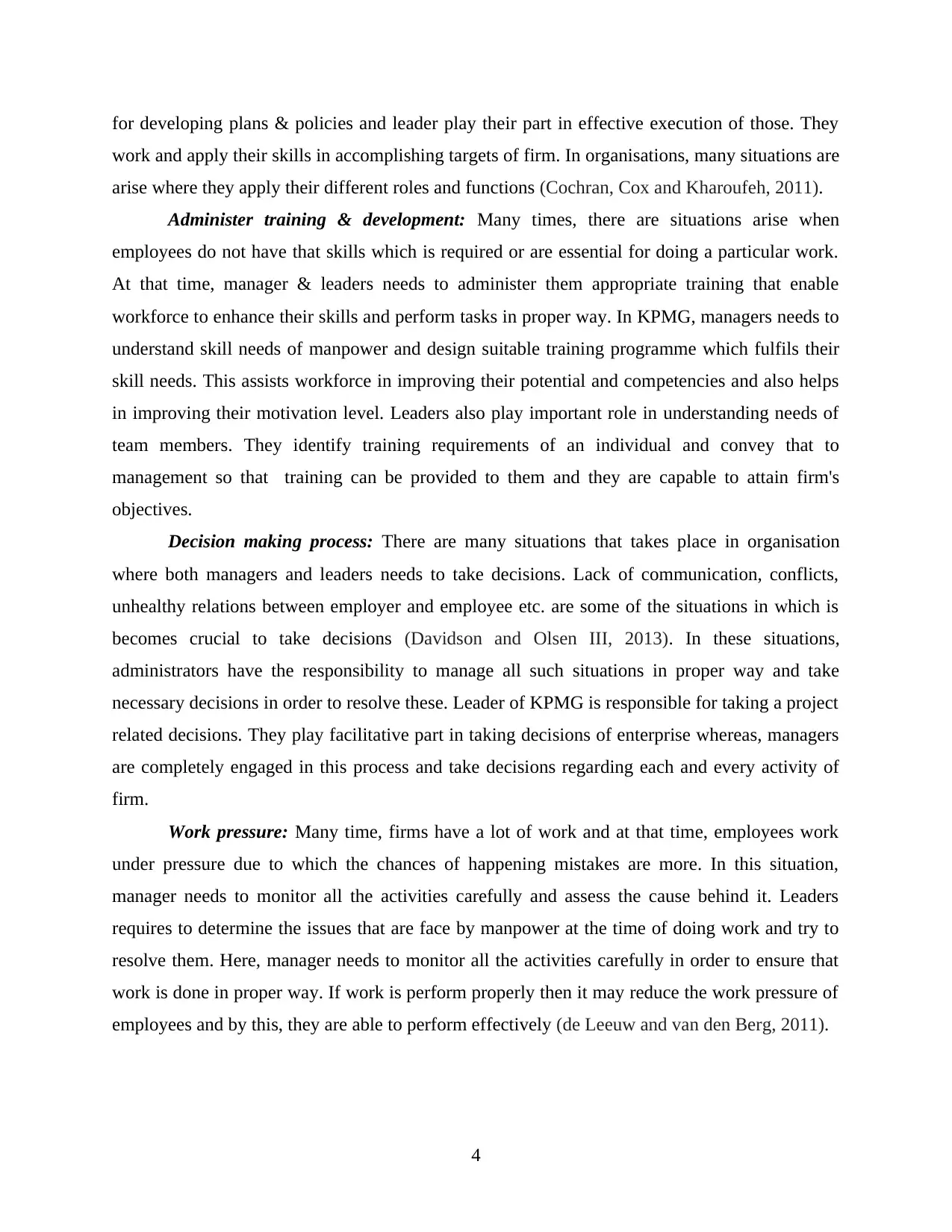
for developing plans & policies and leader play their part in effective execution of those. They
work and apply their skills in accomplishing targets of firm. In organisations, many situations are
arise where they apply their different roles and functions (Cochran, Cox and Kharoufeh, 2011).
Administer training & development: Many times, there are situations arise when
employees do not have that skills which is required or are essential for doing a particular work.
At that time, manager & leaders needs to administer them appropriate training that enable
workforce to enhance their skills and perform tasks in proper way. In KPMG, managers needs to
understand skill needs of manpower and design suitable training programme which fulfils their
skill needs. This assists workforce in improving their potential and competencies and also helps
in improving their motivation level. Leaders also play important role in understanding needs of
team members. They identify training requirements of an individual and convey that to
management so that training can be provided to them and they are capable to attain firm's
objectives.
Decision making process: There are many situations that takes place in organisation
where both managers and leaders needs to take decisions. Lack of communication, conflicts,
unhealthy relations between employer and employee etc. are some of the situations in which is
becomes crucial to take decisions (Davidson and Olsen III, 2013). In these situations,
administrators have the responsibility to manage all such situations in proper way and take
necessary decisions in order to resolve these. Leader of KPMG is responsible for taking a project
related decisions. They play facilitative part in taking decisions of enterprise whereas, managers
are completely engaged in this process and take decisions regarding each and every activity of
firm.
Work pressure: Many time, firms have a lot of work and at that time, employees work
under pressure due to which the chances of happening mistakes are more. In this situation,
manager needs to monitor all the activities carefully and assess the cause behind it. Leaders
requires to determine the issues that are face by manpower at the time of doing work and try to
resolve them. Here, manager needs to monitor all the activities carefully in order to ensure that
work is done in proper way. If work is perform properly then it may reduce the work pressure of
employees and by this, they are able to perform effectively (de Leeuw and van den Berg, 2011).
4
work and apply their skills in accomplishing targets of firm. In organisations, many situations are
arise where they apply their different roles and functions (Cochran, Cox and Kharoufeh, 2011).
Administer training & development: Many times, there are situations arise when
employees do not have that skills which is required or are essential for doing a particular work.
At that time, manager & leaders needs to administer them appropriate training that enable
workforce to enhance their skills and perform tasks in proper way. In KPMG, managers needs to
understand skill needs of manpower and design suitable training programme which fulfils their
skill needs. This assists workforce in improving their potential and competencies and also helps
in improving their motivation level. Leaders also play important role in understanding needs of
team members. They identify training requirements of an individual and convey that to
management so that training can be provided to them and they are capable to attain firm's
objectives.
Decision making process: There are many situations that takes place in organisation
where both managers and leaders needs to take decisions. Lack of communication, conflicts,
unhealthy relations between employer and employee etc. are some of the situations in which is
becomes crucial to take decisions (Davidson and Olsen III, 2013). In these situations,
administrators have the responsibility to manage all such situations in proper way and take
necessary decisions in order to resolve these. Leader of KPMG is responsible for taking a project
related decisions. They play facilitative part in taking decisions of enterprise whereas, managers
are completely engaged in this process and take decisions regarding each and every activity of
firm.
Work pressure: Many time, firms have a lot of work and at that time, employees work
under pressure due to which the chances of happening mistakes are more. In this situation,
manager needs to monitor all the activities carefully and assess the cause behind it. Leaders
requires to determine the issues that are face by manpower at the time of doing work and try to
resolve them. Here, manager needs to monitor all the activities carefully in order to ensure that
work is done in proper way. If work is perform properly then it may reduce the work pressure of
employees and by this, they are able to perform effectively (de Leeuw and van den Berg, 2011).
4
⊘ This is a preview!⊘
Do you want full access?
Subscribe today to unlock all pages.

Trusted by 1+ million students worldwide
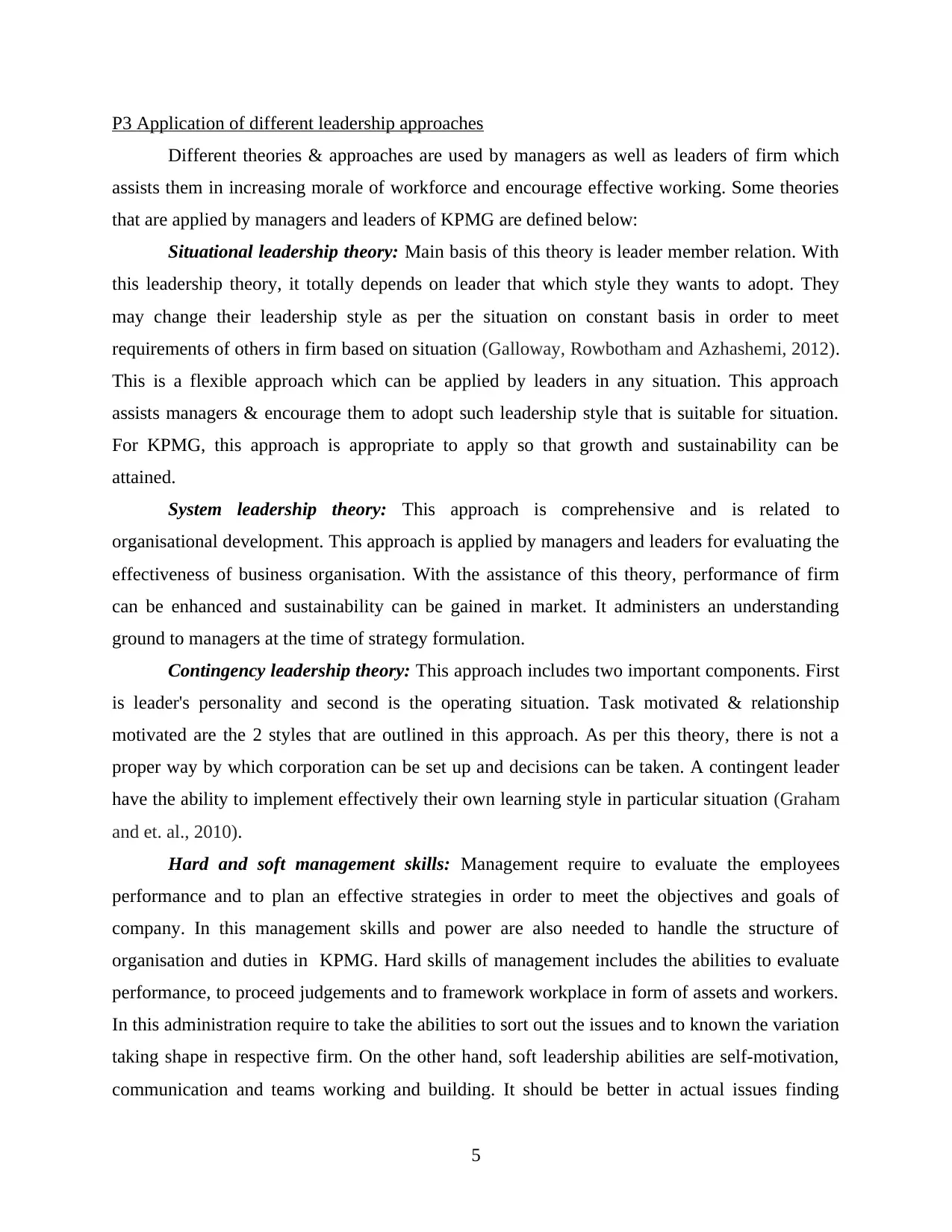
P3 Application of different leadership approaches
Different theories & approaches are used by managers as well as leaders of firm which
assists them in increasing morale of workforce and encourage effective working. Some theories
that are applied by managers and leaders of KPMG are defined below:
Situational leadership theory: Main basis of this theory is leader member relation. With
this leadership theory, it totally depends on leader that which style they wants to adopt. They
may change their leadership style as per the situation on constant basis in order to meet
requirements of others in firm based on situation (Galloway, Rowbotham and Azhashemi, 2012).
This is a flexible approach which can be applied by leaders in any situation. This approach
assists managers & encourage them to adopt such leadership style that is suitable for situation.
For KPMG, this approach is appropriate to apply so that growth and sustainability can be
attained.
System leadership theory: This approach is comprehensive and is related to
organisational development. This approach is applied by managers and leaders for evaluating the
effectiveness of business organisation. With the assistance of this theory, performance of firm
can be enhanced and sustainability can be gained in market. It administers an understanding
ground to managers at the time of strategy formulation.
Contingency leadership theory: This approach includes two important components. First
is leader's personality and second is the operating situation. Task motivated & relationship
motivated are the 2 styles that are outlined in this approach. As per this theory, there is not a
proper way by which corporation can be set up and decisions can be taken. A contingent leader
have the ability to implement effectively their own learning style in particular situation (Graham
and et. al., 2010).
Hard and soft management skills: Management require to evaluate the employees
performance and to plan an effective strategies in order to meet the objectives and goals of
company. In this management skills and power are also needed to handle the structure of
organisation and duties in KPMG. Hard skills of management includes the abilities to evaluate
performance, to proceed judgements and to framework workplace in form of assets and workers.
In this administration require to take the abilities to sort out the issues and to known the variation
taking shape in respective firm. On the other hand, soft leadership abilities are self-motivation,
communication and teams working and building. It should be better in actual issues finding
5
Different theories & approaches are used by managers as well as leaders of firm which
assists them in increasing morale of workforce and encourage effective working. Some theories
that are applied by managers and leaders of KPMG are defined below:
Situational leadership theory: Main basis of this theory is leader member relation. With
this leadership theory, it totally depends on leader that which style they wants to adopt. They
may change their leadership style as per the situation on constant basis in order to meet
requirements of others in firm based on situation (Galloway, Rowbotham and Azhashemi, 2012).
This is a flexible approach which can be applied by leaders in any situation. This approach
assists managers & encourage them to adopt such leadership style that is suitable for situation.
For KPMG, this approach is appropriate to apply so that growth and sustainability can be
attained.
System leadership theory: This approach is comprehensive and is related to
organisational development. This approach is applied by managers and leaders for evaluating the
effectiveness of business organisation. With the assistance of this theory, performance of firm
can be enhanced and sustainability can be gained in market. It administers an understanding
ground to managers at the time of strategy formulation.
Contingency leadership theory: This approach includes two important components. First
is leader's personality and second is the operating situation. Task motivated & relationship
motivated are the 2 styles that are outlined in this approach. As per this theory, there is not a
proper way by which corporation can be set up and decisions can be taken. A contingent leader
have the ability to implement effectively their own learning style in particular situation (Graham
and et. al., 2010).
Hard and soft management skills: Management require to evaluate the employees
performance and to plan an effective strategies in order to meet the objectives and goals of
company. In this management skills and power are also needed to handle the structure of
organisation and duties in KPMG. Hard skills of management includes the abilities to evaluate
performance, to proceed judgements and to framework workplace in form of assets and workers.
In this administration require to take the abilities to sort out the issues and to known the variation
taking shape in respective firm. On the other hand, soft leadership abilities are self-motivation,
communication and teams working and building. It should be better in actual issues finding
5
Paraphrase This Document
Need a fresh take? Get an instant paraphrase of this document with our AI Paraphraser
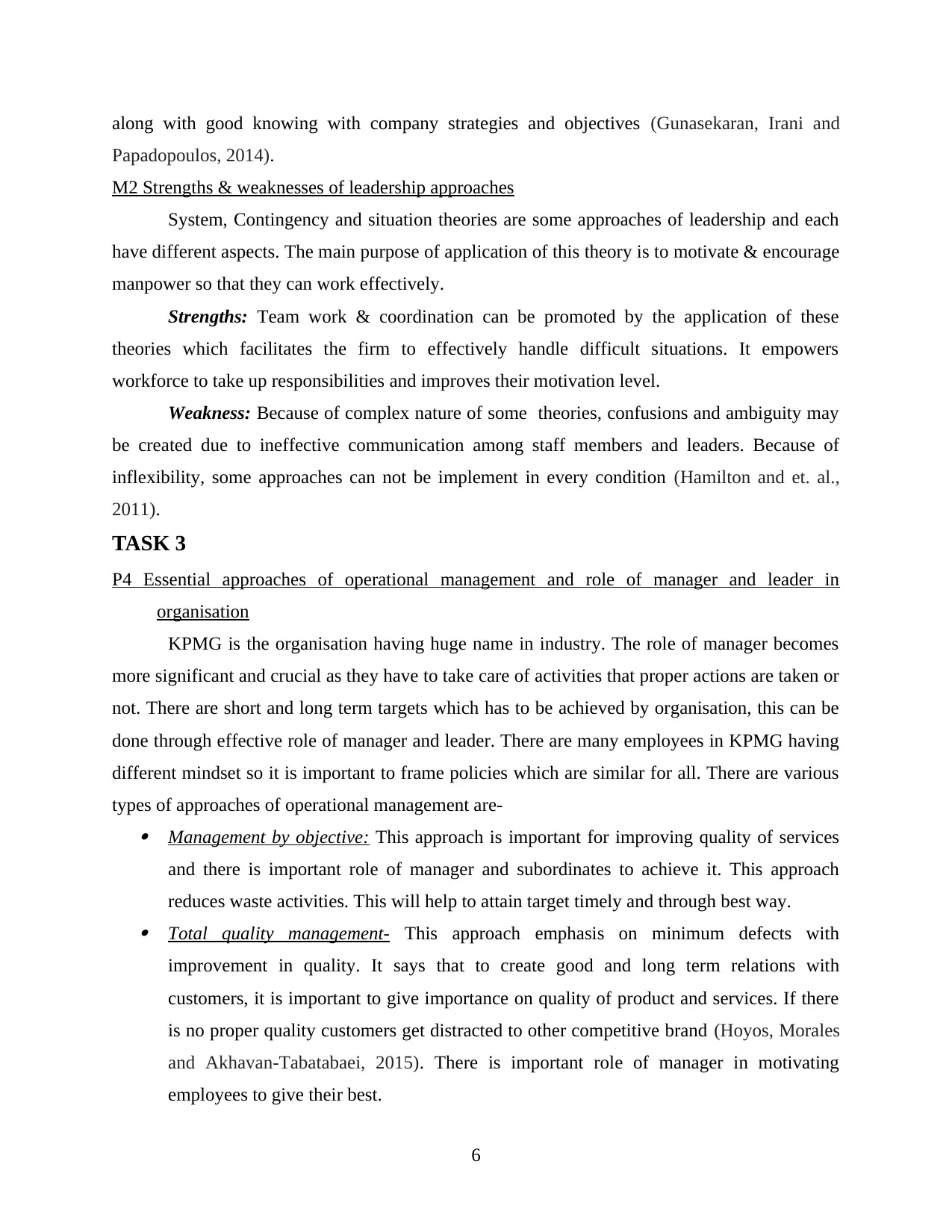
along with good knowing with company strategies and objectives (Gunasekaran, Irani and
Papadopoulos, 2014).
M2 Strengths & weaknesses of leadership approaches
System, Contingency and situation theories are some approaches of leadership and each
have different aspects. The main purpose of application of this theory is to motivate & encourage
manpower so that they can work effectively.
Strengths: Team work & coordination can be promoted by the application of these
theories which facilitates the firm to effectively handle difficult situations. It empowers
workforce to take up responsibilities and improves their motivation level.
Weakness: Because of complex nature of some theories, confusions and ambiguity may
be created due to ineffective communication among staff members and leaders. Because of
inflexibility, some approaches can not be implement in every condition (Hamilton and et. al.,
2011).
TASK 3
P4 Essential approaches of operational management and role of manager and leader in
organisation
KPMG is the organisation having huge name in industry. The role of manager becomes
more significant and crucial as they have to take care of activities that proper actions are taken or
not. There are short and long term targets which has to be achieved by organisation, this can be
done through effective role of manager and leader. There are many employees in KPMG having
different mindset so it is important to frame policies which are similar for all. There are various
types of approaches of operational management are- Management by objective: This approach is important for improving quality of services
and there is important role of manager and subordinates to achieve it. This approach
reduces waste activities. This will help to attain target timely and through best way. Total quality management- This approach emphasis on minimum defects with
improvement in quality. It says that to create good and long term relations with
customers, it is important to give importance on quality of product and services. If there
is no proper quality customers get distracted to other competitive brand (Hoyos, Morales
and Akhavan-Tabatabaei, 2015). There is important role of manager in motivating
employees to give their best.
6
Papadopoulos, 2014).
M2 Strengths & weaknesses of leadership approaches
System, Contingency and situation theories are some approaches of leadership and each
have different aspects. The main purpose of application of this theory is to motivate & encourage
manpower so that they can work effectively.
Strengths: Team work & coordination can be promoted by the application of these
theories which facilitates the firm to effectively handle difficult situations. It empowers
workforce to take up responsibilities and improves their motivation level.
Weakness: Because of complex nature of some theories, confusions and ambiguity may
be created due to ineffective communication among staff members and leaders. Because of
inflexibility, some approaches can not be implement in every condition (Hamilton and et. al.,
2011).
TASK 3
P4 Essential approaches of operational management and role of manager and leader in
organisation
KPMG is the organisation having huge name in industry. The role of manager becomes
more significant and crucial as they have to take care of activities that proper actions are taken or
not. There are short and long term targets which has to be achieved by organisation, this can be
done through effective role of manager and leader. There are many employees in KPMG having
different mindset so it is important to frame policies which are similar for all. There are various
types of approaches of operational management are- Management by objective: This approach is important for improving quality of services
and there is important role of manager and subordinates to achieve it. This approach
reduces waste activities. This will help to attain target timely and through best way. Total quality management- This approach emphasis on minimum defects with
improvement in quality. It says that to create good and long term relations with
customers, it is important to give importance on quality of product and services. If there
is no proper quality customers get distracted to other competitive brand (Hoyos, Morales
and Akhavan-Tabatabaei, 2015). There is important role of manager in motivating
employees to give their best.
6
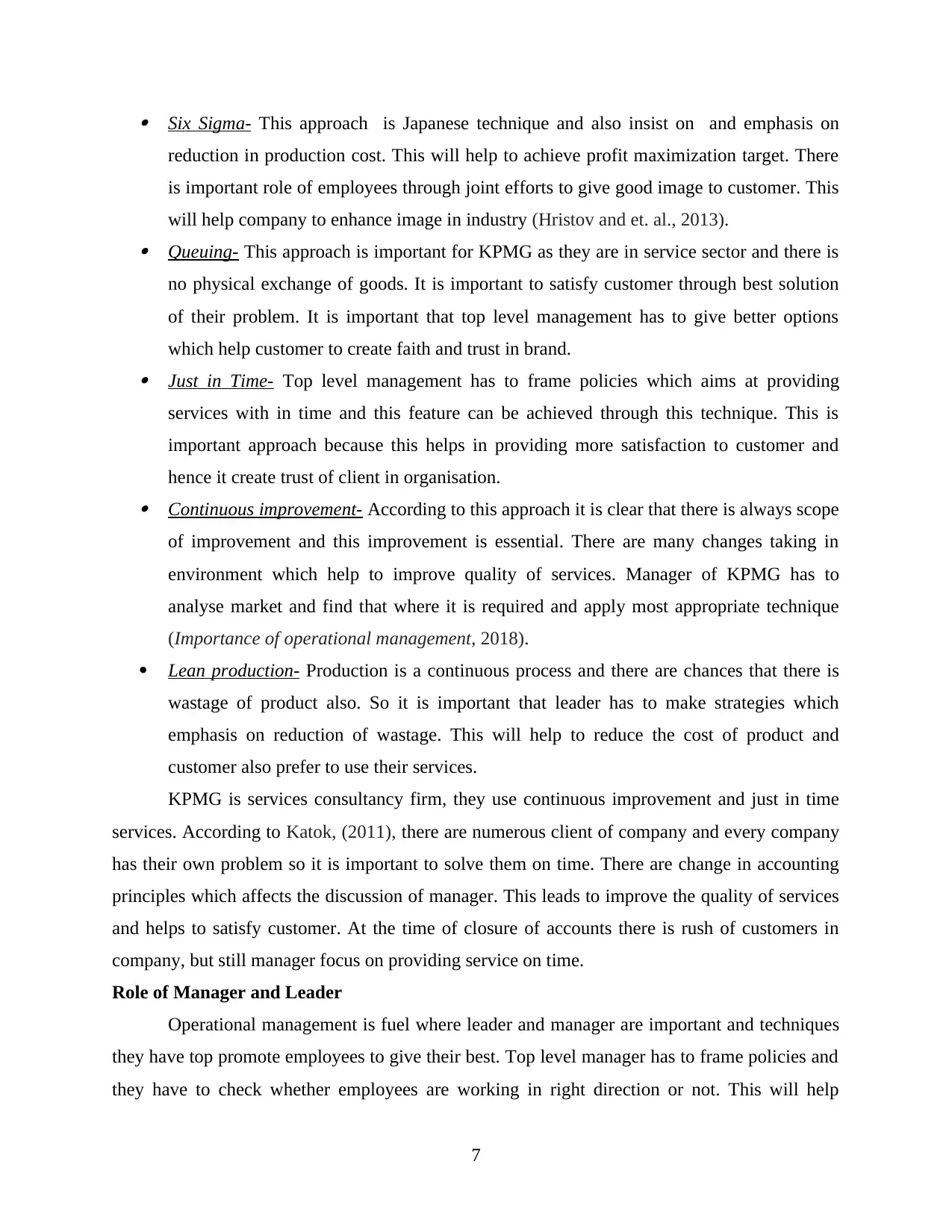
Six Sigma- This approach is Japanese technique and also insist on and emphasis on
reduction in production cost. This will help to achieve profit maximization target. There
is important role of employees through joint efforts to give good image to customer. This
will help company to enhance image in industry (Hristov and et. al., 2013). Queuing- This approach is important for KPMG as they are in service sector and there is
no physical exchange of goods. It is important to satisfy customer through best solution
of their problem. It is important that top level management has to give better options
which help customer to create faith and trust in brand. Just in Time- Top level management has to frame policies which aims at providing
services with in time and this feature can be achieved through this technique. This is
important approach because this helps in providing more satisfaction to customer and
hence it create trust of client in organisation. Continuous improvement- According to this approach it is clear that there is always scope
of improvement and this improvement is essential. There are many changes taking in
environment which help to improve quality of services. Manager of KPMG has to
analyse market and find that where it is required and apply most appropriate technique
(Importance of operational management, 2018).
Lean production- Production is a continuous process and there are chances that there is
wastage of product also. So it is important that leader has to make strategies which
emphasis on reduction of wastage. This will help to reduce the cost of product and
customer also prefer to use their services.
KPMG is services consultancy firm, they use continuous improvement and just in time
services. According to Katok, (2011), there are numerous client of company and every company
has their own problem so it is important to solve them on time. There are change in accounting
principles which affects the discussion of manager. This leads to improve the quality of services
and helps to satisfy customer. At the time of closure of accounts there is rush of customers in
company, but still manager focus on providing service on time.
Role of Manager and Leader
Operational management is fuel where leader and manager are important and techniques
they have top promote employees to give their best. Top level manager has to frame policies and
they have to check whether employees are working in right direction or not. This will help
7
reduction in production cost. This will help to achieve profit maximization target. There
is important role of employees through joint efforts to give good image to customer. This
will help company to enhance image in industry (Hristov and et. al., 2013). Queuing- This approach is important for KPMG as they are in service sector and there is
no physical exchange of goods. It is important to satisfy customer through best solution
of their problem. It is important that top level management has to give better options
which help customer to create faith and trust in brand. Just in Time- Top level management has to frame policies which aims at providing
services with in time and this feature can be achieved through this technique. This is
important approach because this helps in providing more satisfaction to customer and
hence it create trust of client in organisation. Continuous improvement- According to this approach it is clear that there is always scope
of improvement and this improvement is essential. There are many changes taking in
environment which help to improve quality of services. Manager of KPMG has to
analyse market and find that where it is required and apply most appropriate technique
(Importance of operational management, 2018).
Lean production- Production is a continuous process and there are chances that there is
wastage of product also. So it is important that leader has to make strategies which
emphasis on reduction of wastage. This will help to reduce the cost of product and
customer also prefer to use their services.
KPMG is services consultancy firm, they use continuous improvement and just in time
services. According to Katok, (2011), there are numerous client of company and every company
has their own problem so it is important to solve them on time. There are change in accounting
principles which affects the discussion of manager. This leads to improve the quality of services
and helps to satisfy customer. At the time of closure of accounts there is rush of customers in
company, but still manager focus on providing service on time.
Role of Manager and Leader
Operational management is fuel where leader and manager are important and techniques
they have top promote employees to give their best. Top level manager has to frame policies and
they have to check whether employees are working in right direction or not. This will help
7
⊘ This is a preview!⊘
Do you want full access?
Subscribe today to unlock all pages.

Trusted by 1+ million students worldwide
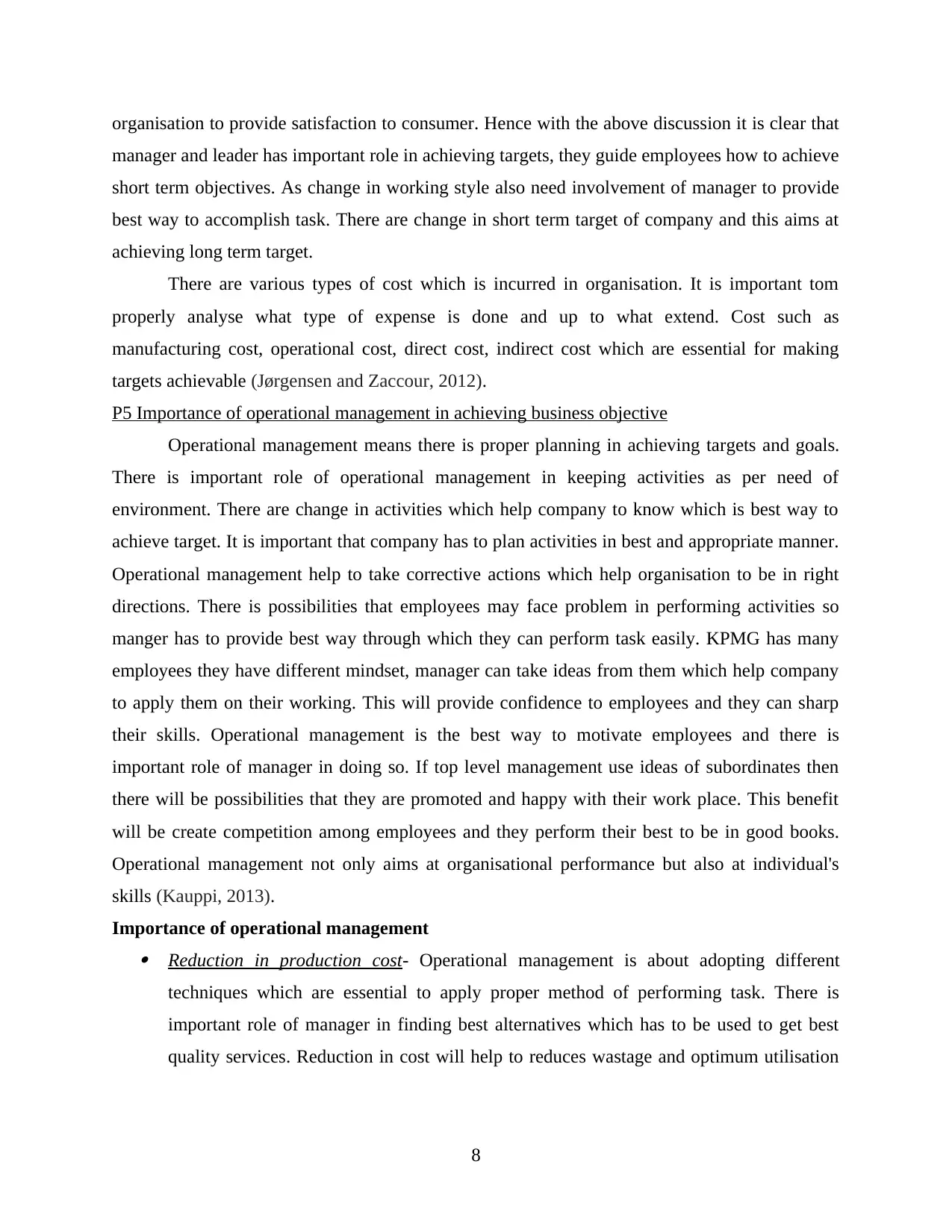
organisation to provide satisfaction to consumer. Hence with the above discussion it is clear that
manager and leader has important role in achieving targets, they guide employees how to achieve
short term objectives. As change in working style also need involvement of manager to provide
best way to accomplish task. There are change in short term target of company and this aims at
achieving long term target.
There are various types of cost which is incurred in organisation. It is important tom
properly analyse what type of expense is done and up to what extend. Cost such as
manufacturing cost, operational cost, direct cost, indirect cost which are essential for making
targets achievable (Jørgensen and Zaccour, 2012).
P5 Importance of operational management in achieving business objective
Operational management means there is proper planning in achieving targets and goals.
There is important role of operational management in keeping activities as per need of
environment. There are change in activities which help company to know which is best way to
achieve target. It is important that company has to plan activities in best and appropriate manner.
Operational management help to take corrective actions which help organisation to be in right
directions. There is possibilities that employees may face problem in performing activities so
manger has to provide best way through which they can perform task easily. KPMG has many
employees they have different mindset, manager can take ideas from them which help company
to apply them on their working. This will provide confidence to employees and they can sharp
their skills. Operational management is the best way to motivate employees and there is
important role of manager in doing so. If top level management use ideas of subordinates then
there will be possibilities that they are promoted and happy with their work place. This benefit
will be create competition among employees and they perform their best to be in good books.
Operational management not only aims at organisational performance but also at individual's
skills (Kauppi, 2013).
Importance of operational management Reduction in production cost- Operational management is about adopting different
techniques which are essential to apply proper method of performing task. There is
important role of manager in finding best alternatives which has to be used to get best
quality services. Reduction in cost will help to reduces wastage and optimum utilisation
8
manager and leader has important role in achieving targets, they guide employees how to achieve
short term objectives. As change in working style also need involvement of manager to provide
best way to accomplish task. There are change in short term target of company and this aims at
achieving long term target.
There are various types of cost which is incurred in organisation. It is important tom
properly analyse what type of expense is done and up to what extend. Cost such as
manufacturing cost, operational cost, direct cost, indirect cost which are essential for making
targets achievable (Jørgensen and Zaccour, 2012).
P5 Importance of operational management in achieving business objective
Operational management means there is proper planning in achieving targets and goals.
There is important role of operational management in keeping activities as per need of
environment. There are change in activities which help company to know which is best way to
achieve target. It is important that company has to plan activities in best and appropriate manner.
Operational management help to take corrective actions which help organisation to be in right
directions. There is possibilities that employees may face problem in performing activities so
manger has to provide best way through which they can perform task easily. KPMG has many
employees they have different mindset, manager can take ideas from them which help company
to apply them on their working. This will provide confidence to employees and they can sharp
their skills. Operational management is the best way to motivate employees and there is
important role of manager in doing so. If top level management use ideas of subordinates then
there will be possibilities that they are promoted and happy with their work place. This benefit
will be create competition among employees and they perform their best to be in good books.
Operational management not only aims at organisational performance but also at individual's
skills (Kauppi, 2013).
Importance of operational management Reduction in production cost- Operational management is about adopting different
techniques which are essential to apply proper method of performing task. There is
important role of manager in finding best alternatives which has to be used to get best
quality services. Reduction in cost will help to reduces wastage and optimum utilisation
8
Paraphrase This Document
Need a fresh take? Get an instant paraphrase of this document with our AI Paraphraser
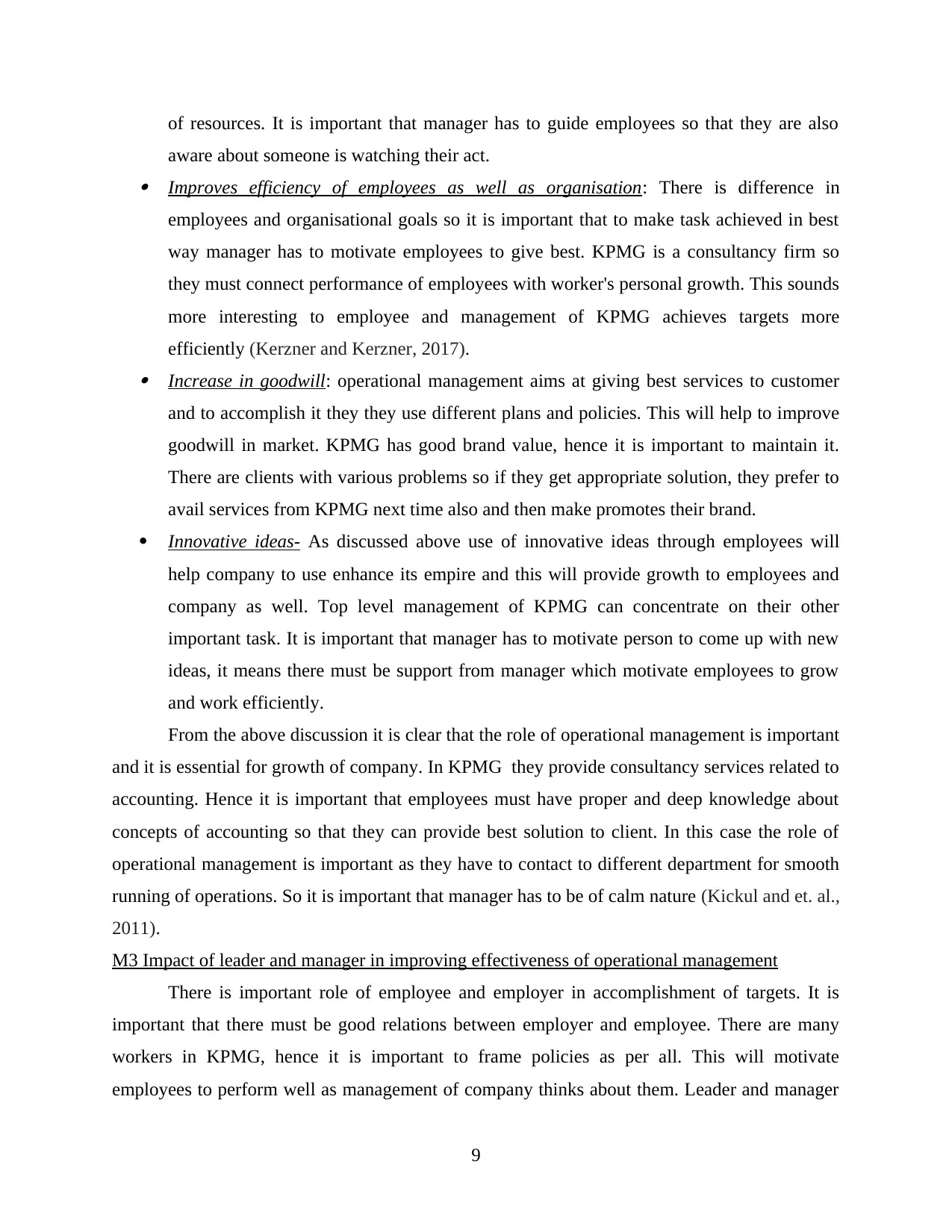
of resources. It is important that manager has to guide employees so that they are also
aware about someone is watching their act. Improves efficiency of employees as well as organisation: There is difference in
employees and organisational goals so it is important that to make task achieved in best
way manager has to motivate employees to give best. KPMG is a consultancy firm so
they must connect performance of employees with worker's personal growth. This sounds
more interesting to employee and management of KPMG achieves targets more
efficiently (Kerzner and Kerzner, 2017). Increase in goodwill: operational management aims at giving best services to customer
and to accomplish it they they use different plans and policies. This will help to improve
goodwill in market. KPMG has good brand value, hence it is important to maintain it.
There are clients with various problems so if they get appropriate solution, they prefer to
avail services from KPMG next time also and then make promotes their brand.
Innovative ideas- As discussed above use of innovative ideas through employees will
help company to use enhance its empire and this will provide growth to employees and
company as well. Top level management of KPMG can concentrate on their other
important task. It is important that manager has to motivate person to come up with new
ideas, it means there must be support from manager which motivate employees to grow
and work efficiently.
From the above discussion it is clear that the role of operational management is important
and it is essential for growth of company. In KPMG they provide consultancy services related to
accounting. Hence it is important that employees must have proper and deep knowledge about
concepts of accounting so that they can provide best solution to client. In this case the role of
operational management is important as they have to contact to different department for smooth
running of operations. So it is important that manager has to be of calm nature (Kickul and et. al.,
2011).
M3 Impact of leader and manager in improving effectiveness of operational management
There is important role of employee and employer in accomplishment of targets. It is
important that there must be good relations between employer and employee. There are many
workers in KPMG, hence it is important to frame policies as per all. This will motivate
employees to perform well as management of company thinks about them. Leader and manager
9
aware about someone is watching their act. Improves efficiency of employees as well as organisation: There is difference in
employees and organisational goals so it is important that to make task achieved in best
way manager has to motivate employees to give best. KPMG is a consultancy firm so
they must connect performance of employees with worker's personal growth. This sounds
more interesting to employee and management of KPMG achieves targets more
efficiently (Kerzner and Kerzner, 2017). Increase in goodwill: operational management aims at giving best services to customer
and to accomplish it they they use different plans and policies. This will help to improve
goodwill in market. KPMG has good brand value, hence it is important to maintain it.
There are clients with various problems so if they get appropriate solution, they prefer to
avail services from KPMG next time also and then make promotes their brand.
Innovative ideas- As discussed above use of innovative ideas through employees will
help company to use enhance its empire and this will provide growth to employees and
company as well. Top level management of KPMG can concentrate on their other
important task. It is important that manager has to motivate person to come up with new
ideas, it means there must be support from manager which motivate employees to grow
and work efficiently.
From the above discussion it is clear that the role of operational management is important
and it is essential for growth of company. In KPMG they provide consultancy services related to
accounting. Hence it is important that employees must have proper and deep knowledge about
concepts of accounting so that they can provide best solution to client. In this case the role of
operational management is important as they have to contact to different department for smooth
running of operations. So it is important that manager has to be of calm nature (Kickul and et. al.,
2011).
M3 Impact of leader and manager in improving effectiveness of operational management
There is important role of employee and employer in accomplishment of targets. It is
important that there must be good relations between employer and employee. There are many
workers in KPMG, hence it is important to frame policies as per all. This will motivate
employees to perform well as management of company thinks about them. Leader and manager
9
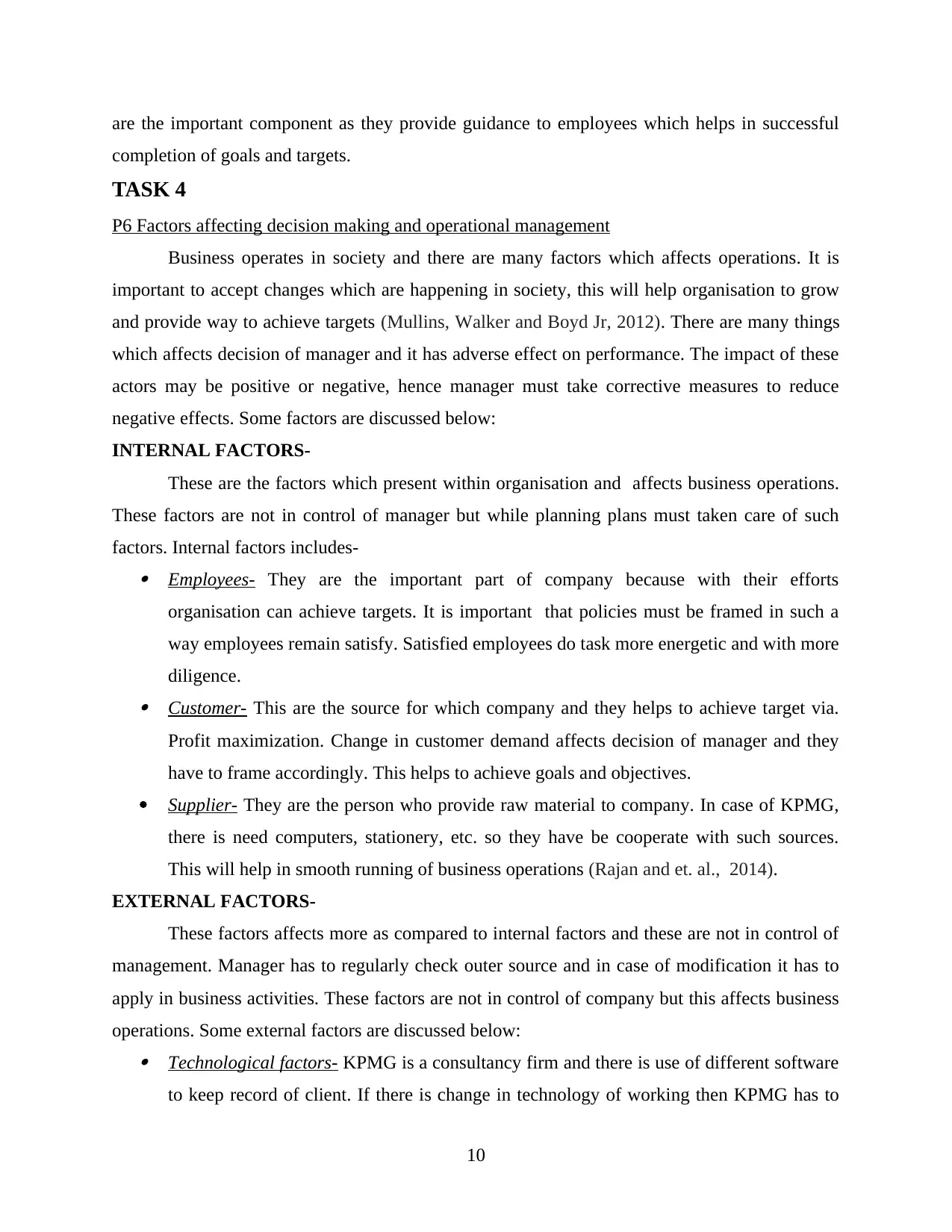
are the important component as they provide guidance to employees which helps in successful
completion of goals and targets.
TASK 4
P6 Factors affecting decision making and operational management
Business operates in society and there are many factors which affects operations. It is
important to accept changes which are happening in society, this will help organisation to grow
and provide way to achieve targets (Mullins, Walker and Boyd Jr, 2012). There are many things
which affects decision of manager and it has adverse effect on performance. The impact of these
actors may be positive or negative, hence manager must take corrective measures to reduce
negative effects. Some factors are discussed below:
INTERNAL FACTORS-
These are the factors which present within organisation and affects business operations.
These factors are not in control of manager but while planning plans must taken care of such
factors. Internal factors includes- Employees- They are the important part of company because with their efforts
organisation can achieve targets. It is important that policies must be framed in such a
way employees remain satisfy. Satisfied employees do task more energetic and with more
diligence. Customer- This are the source for which company and they helps to achieve target via.
Profit maximization. Change in customer demand affects decision of manager and they
have to frame accordingly. This helps to achieve goals and objectives.
Supplier- They are the person who provide raw material to company. In case of KPMG,
there is need computers, stationery, etc. so they have be cooperate with such sources.
This will help in smooth running of business operations (Rajan and et. al., 2014).
EXTERNAL FACTORS-
These factors affects more as compared to internal factors and these are not in control of
management. Manager has to regularly check outer source and in case of modification it has to
apply in business activities. These factors are not in control of company but this affects business
operations. Some external factors are discussed below: Technological factors- KPMG is a consultancy firm and there is use of different software
to keep record of client. If there is change in technology of working then KPMG has to
10
completion of goals and targets.
TASK 4
P6 Factors affecting decision making and operational management
Business operates in society and there are many factors which affects operations. It is
important to accept changes which are happening in society, this will help organisation to grow
and provide way to achieve targets (Mullins, Walker and Boyd Jr, 2012). There are many things
which affects decision of manager and it has adverse effect on performance. The impact of these
actors may be positive or negative, hence manager must take corrective measures to reduce
negative effects. Some factors are discussed below:
INTERNAL FACTORS-
These are the factors which present within organisation and affects business operations.
These factors are not in control of manager but while planning plans must taken care of such
factors. Internal factors includes- Employees- They are the important part of company because with their efforts
organisation can achieve targets. It is important that policies must be framed in such a
way employees remain satisfy. Satisfied employees do task more energetic and with more
diligence. Customer- This are the source for which company and they helps to achieve target via.
Profit maximization. Change in customer demand affects decision of manager and they
have to frame accordingly. This helps to achieve goals and objectives.
Supplier- They are the person who provide raw material to company. In case of KPMG,
there is need computers, stationery, etc. so they have be cooperate with such sources.
This will help in smooth running of business operations (Rajan and et. al., 2014).
EXTERNAL FACTORS-
These factors affects more as compared to internal factors and these are not in control of
management. Manager has to regularly check outer source and in case of modification it has to
apply in business activities. These factors are not in control of company but this affects business
operations. Some external factors are discussed below: Technological factors- KPMG is a consultancy firm and there is use of different software
to keep record of client. If there is change in technology of working then KPMG has to
10
⊘ This is a preview!⊘
Do you want full access?
Subscribe today to unlock all pages.

Trusted by 1+ million students worldwide
1 out of 17
Related Documents
Your All-in-One AI-Powered Toolkit for Academic Success.
+13062052269
info@desklib.com
Available 24*7 on WhatsApp / Email
![[object Object]](/_next/static/media/star-bottom.7253800d.svg)
Unlock your academic potential
Copyright © 2020–2026 A2Z Services. All Rights Reserved. Developed and managed by ZUCOL.





